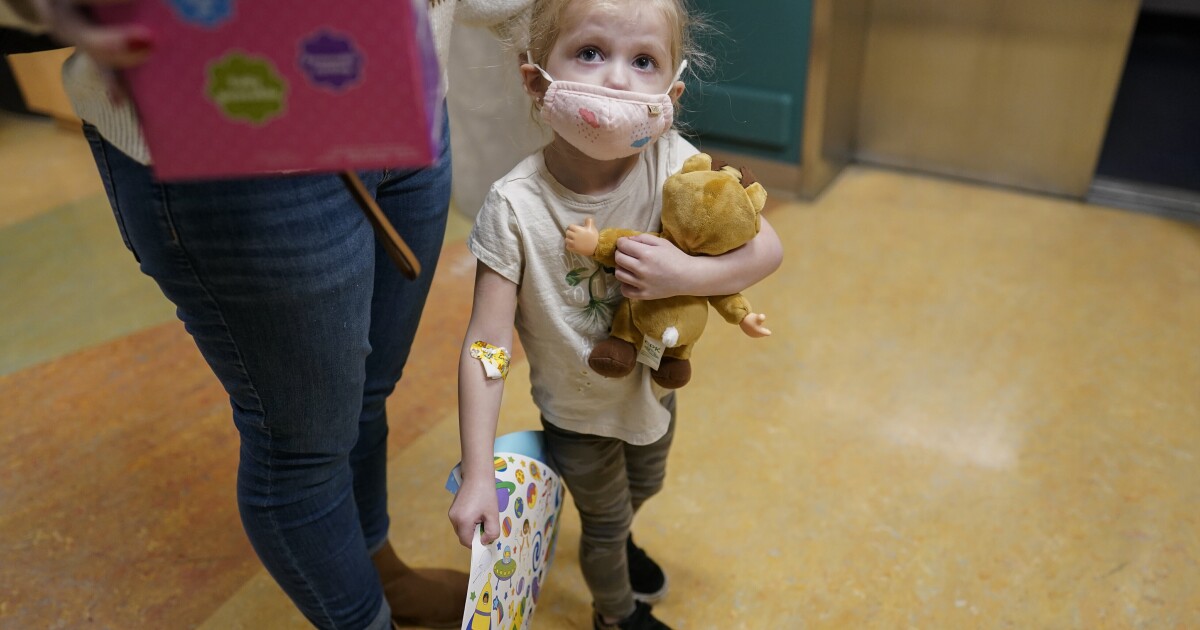Eight-year-old Brooklynn Chiles looks restless on a bed as she waits for a nurse at Nationwide Children’s Hospital. The white paper under her makes noise as she moves and looks around her. This is the third time she has contracted the coronavirus and no one knows why that is.
Deep down, Brooklynn is lucky. Each time his test came back positive, she had no obvious symptoms. But her father, Rodney, was infected in September, when she was also infected, and died of the virus. Her mother, Danielle Mitchell, suffers thinking that the girl will get infected again and she fears that she will get seriously ill even though she is vaccinated.
“Every time it gets infected, I think, ‘Am I going to go through the same thing?’” she said, sitting in a corner. “Am I going to lose them all?”
One of the most puzzling aspects of the coronavirus, which has killed more than 6 million people worldwide since it appeared in 2019, is the symptoms in children.
In the United States alone, more than 12.7 million kids have tested positive, according to the American Academy of Pediatrics. In general, the virus does not attack minors with the same virulence as adults.
But, as with adults, there are rare cases. Some kids have unexplained symptoms long after the virus is gone. Others get infected again. Many appear to make a full recovery, but later suffer from a mysterious condition that causes their organs to swell.
Sometimes all this happens while mourning the death of loved ones due to the virus or other situations that disrupt a normal childhood.
Doctors are studying the long-term effects of COVID-19 on children, including its impact on their development and health, both physically and mentally, and how their nascent immune systems respond to the virus, in an effort to determine why some kids respond poorly to the virus and others don’t.
The National Children’s Hospital studies the cases of some 200 boys and young people up to 21 years of age and adds an average of two patients per week to its investigation. Follow the evolution of children who have contracted the virus and others who have not, including their brothers.
Dr. Roberta DeBiasi, who is leading the study, said the main objective is to check the complications that children suffer after contracting COVID-19 and to see how common they are.
Brooklynn is participating in the study, as is Alyssa Carpenter, a three-year-old girl who has been infected with the coronavirus twice and is suffering from unusual symptoms, including rare fevers that come on suddenly. Her feet turn red and hurt.
Alyssa has two siblings, Audrey, five, and Hailey, nine, on the autism spectrum. For this family, as for so many others, the pandemic has been a nightmare: school suspensions, unproductive work, restrictions and confusion.
“It’s super frustrating,” says Tara Carpenter, Alyssa’s mother. “We are looking for answers for our girl and no one can give us them.”
Alyssa is taken to the hospital whenever her feet hurt or she develops a fever, but she has no other symptoms and is sent home. She misses many days of school and this complicates her parents, who must stay home. However, she goes to ballet classes and carries herself completely normally.
In recent months, Alyssa’s symptoms have diminished, but questions remain.
Sometimes, the visits of infected children to the hospital are the least of it. The whole family dynamic is altered. The infected girl or boy receives all the attention in the hospital and her little siblings feel ignored, as happens to Charlie when her younger sister Lexie goes to the hospital. Parents must deal not only with a child’s illness but also with the feelings of their siblings.
Dr. Linda Herbert is in charge of the psychological evaluation of the patients in the study.
“There are a number of symptoms,” he said. “Some are very alarmed about the possibility of getting the virus again.”
And the symptoms are perceived not only in the infected children but also in their parents and siblings.
Danielle Mitchell, Brooklynn’s mother, is overwhelmed. A single mother who works full time, she suffered the loss of her partner and tries not to get depressed when she is with her daughter.
“It keeps getting infected. Is there nothing that can be done to protect her?” she asks.
Mitchell is sorry that the girl’s father is not with them to help her. Rodney Chiles, her longtime partner, had not been vaccinated and died of COVID-19.
He had doubts about the vaccine and decided to wait to be inoculated. Shortly after Brooklynn’s test came back positive, he began to feel unwell. He had health problems and did not resist the virus. He passed away at the age of 42.
“He calls us on a Sunday and tells us, ‘I’m going to be intubated because I can’t retain oxygen. I love them. Brooklynn, forgive me,’” Mitchell recounted. It was the last conversation they had. Shortly after she passed away.
“I’m still alive because I have a daughter,” Mitchell said.
Brooklynn’s mother believes that “even the kids who don’t get it are suffering.”
“They lose their parents, their social life suffers, they give away years. Yes, the boys are strong, but this can’t go on like this. No one is that strong.”
–


